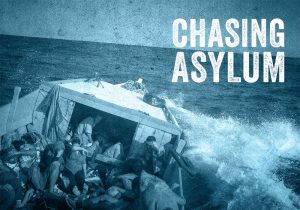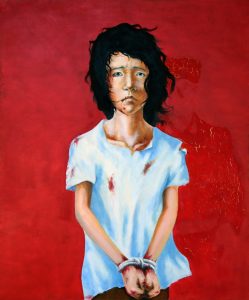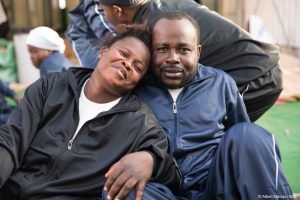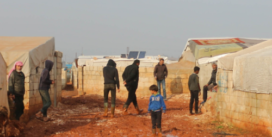- Fall Newsletter, 2025, Issue 15
- Using International Online Learning Modules to Engage Students in the Study of Critical Global Issues
- Upcoming Book Launch: Hearts of Freedom
- Announcing winners of the 2025 CARFMS Essay Contest
- The New York Declaration for Refugees and Migrants and its two Global Compacts: Addressing the Symptoms or the “Root Causes” of Forced Displacement?*
CARFMS17 Special Events
Film
 Chasing Asylum
Chasing Asylum
A Q&A with Director Eva Orner to follow
17 May 4:30 – 6:30pm
David Lam Auditorium
University of Victoria
Chasing Asylum exposes the real impact of Australia’s offshore detention policies and explores how ‘The Lucky Country’ became a country where leaders choose detention over compassion and governments deprive the desperate of their basic human rights. The film features never before seen footage from inside Australia’s offshore detention camps, revealing the personal impact of sending those in search of a safe home to languish in limbo. Chasing Asylum explores the mental, physical and fiscal consequences of Australia’s decision to lock away families in unsanitary conditions hidden from media scrutiny, destroying their lives under the pretext of saving them.
Chasing Asylum (2016) – Trailer
Art Exhibition
 North Korean Refugee Art: Yeomyung School in Seoul, South Korea
North Korean Refugee Art: Yeomyung School in Seoul, South Korea
Curator Dr. Shin Ji Kang, James Madison University
15 – 18 May
Throughout MacLaurin Building
University of Victoria
Artworks created by North Korean refugee students as a part of art therapy at Yeomyung School in Seoul, South Korea. This school was founded in 2004 to address specific needs and challenges of North Korean refugee youths resettled in South Korea. The background stories are narrated by the art teacher Ms. Duk-Ae Yoon, based on her interactions with each student. Many students at Yeomyung first migrated to China, crossing rivers and borders for economic opportunities. This is the time period when students were exposed to and learned about other lives that they had never imagined before.
Photo Exhibit
 Double Jeopardy in Forced Migration: Humanitarian Consequences and Responses
Double Jeopardy in Forced Migration: Humanitarian Consequences and Responses
Curated by Carol Divine, Medcins Sans Frontieres
Refugees, migrants, internally displaced persons and asylum seekers are forced to flee to seek safety for themselves and their families. They are people affected by war, violence and human-created environmental crises in their countries of origin. Often there is no exit and many are trapped in precarious conditions or under bombs. Those who manage to escape, risk their lives to cross borders, navigate dangerous routes, or face harsh conditions in detention or overcrowded refugee camps in a struggle for survival.
MSF’s field teams assist in many places they flee from: war zones such as Syria and Iraq, or countries such as Honduras, where violence has forced thousands to flee their homes to Mexico. In refugee camps, detention centers, shelters, railways, rescue vessels in the Mediterranean Sea, MSF provides medical care and mental health support along some of the most dangerous migratory routes.
Many people in flight face a double jeopardy – the violence they flee from and the extreme violence they face in flight because there are no safe and legal routes for seeking asylum, they are blocked in or sent to precarious places or are forcibly returned home. Forced migrants today face physical walls and barriers and often rely on irregular routes and abuse at the hands of smugglers along the way.
Asylum seekers and refugees are protected under international law. Yet a global trend is a retreat from obligations and a hardening of policies for and attitudes towards migrants. The humanitarian consequences on people’s health and wellbeing are severe. Millions languish without adequate food, water, healthcare, protection shelter and respect for their human dignity.
This photo exhibit shares images (3-4) and stories from three-four contexts where MSF works with migrants and refugees in extremely vulnerable situations – caused not only by neglect of states but also by the impact of walls and policies; a turning away from need. It aims to share the realities and humanity of individuals in flight.
Photo: April 4, 2017 Connie & Baba are Ghanaian. In #Libya they were kidnapped, enduring violence and abuse every day for several weeks. Today they reached safety. Since 2015, MSF has been running searchand-rescue operations in the Mediterranean Sea, in response to a humanitarian crisis that saw more than 4,000 people perish last year alone while trying to reach safety in Europe and flee conflict, disaster and turmoil in their home countries. Photo: Albert Masias/MSF
Workshop
Graduate Student Workshop
Chair: Jona Zyfi (University of Toronto/Canada)
While providing access to many learning opportunities and engaging experiences, university life can also present a lot of frustrating roadblocks and overwhelming pressures. Indeed, mental illness often strikes individuals during the years that they attend university. As a result, many students manage issues related to their mental health and well-being on a daily basis. The stigma surrounding mental health can make it difficult to ask for help however, early identification and treatment can help make a major difference in the lives of those affected. It is also recognized that graduate students face unique challenges as they are often required to find the delicate balance between life as a graduate student and working with vulnerable populations such as migrants or asylum seekers. Join us for a skill-sharing and interactive discussion related to mental health and well-being. We will also be sharing a range of resources and start working towards the More Feet on the Ground mental health training certificate.
Special Presentation: Pacific Stream
Hosted by Pacific People Partnership Session
with
Selwyn Toa (University of Maryland/ Vanuatu)
Eugene Lee (University of Victoria/Borneo)
16 May – 4:30pm
MAC D115 or online via Youtube
Community Narratives of Climate Change is an interactive panel featuring the voices of South Pacific Islanders on the relationships between climate change, community displacement and Indigenous knowledge. With Pacific Islanders widely portrayed as the first climate refugees, our panelists will unpack the disconnect between community-based and global narratives of climate change, and how the climate refugee narrative interacts with Indigenous identities and histories of Pacific Islanders. The panel will be an educational and participatory experience, live broadcast as part of our Pacific Stream series to communities across the South Pacific. Audience members will have the opportunity to ask questions. Panelists include Selwyn Toa (Vanuatu) and Eugene Lee (Borneo). We thank Kirk Schwartz from MediaNet for technical support.
